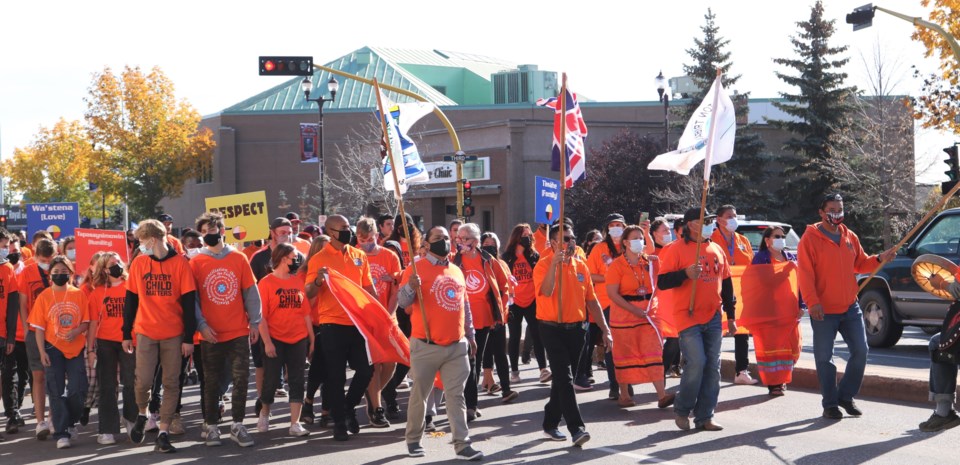Council unanimously supported authorizing the Mayor to connect with the Office of the Treaty Commissioner to:
* Ensure that Council and Senior Administration learn about Treaty History, the importance of building a strong relationship between First Nations and non-First Nations people in our community, and additional information about their Truth and Reconciliation through Treaty Implementation (TRTI) Framework.
* Request a collaboration with the Office of the Treaty Commissioner to help the City create an action plan for Truth Reconciliation and Treaty Implementation for our organization.
And further, that Administration move forward with establishing a Truth and Reconciliation education program for Council members, Council Committee members and all City staff.
The recommendations related back to an Aug. 30, presentation to Council by SIGN Executive Director Andrew Sedley, explained Lisa Washington - Manager of Community, Culture & Heritage, with the City at the regular meeting of Council.
At the time Sedley, “talked about his organization’s path towards addressing the Truth and Reconciliation Commission’s 94 Calls to Action and further requested that our elected officials, as representatives of our citizens, review what is currently being done at the municipal government level toward reconciliation and develop a framework to move forward,” said Washington.
Council passed a resolution to “receive and file the letter and presentation from SIGN regarding Truth and Reconciliation and further, to direct Administration to provide a report detailing a framework of recommendations related to the 9 Municipal Calls to Action for Truth and Reconciliation, and further, to investigate the process for designation of the City of Yorkton as a ‘City of Reconciliation’ for Council consideration at a future meeting of Council”
As background Washington noted, the Truth and Reconciliation Commission (TRC) provided those people directly, or indirectly affected by the legacy of the Indian Residential Schools system, with an opportunity to share their stories and experiences.
On June 2, 2015, the TRC released a report with 94 Calls to Action for reconciliation for governments and other stakeholders.
The TRC Final Report included specific Principles of Reconciliation, which the Truth and Reconciliation Commission of Canada believes Indigenous and non-Indigenous Canadians must follow for Canada to flourish in the 21st Century.
“Reconciliation is a process that does not happen in isolation or in a vacuum. It is a relational process where the parties learn to trust each other, gain a better understanding of each other and craft a path forward, together. It needs to be based on understanding, which comes from hearing the truth about our country’s history. It is grounded in education about the nation-to-nation relationship between Indigenous and non-Indigenous peoples in Canada and our community,” said Washington.
Washington said steps need to happen so that the City of Yorkton, as an order of government, can move forward with the Calls to Action.
The Office of the Treaty Commissioner (OTC) is available to provide assistance as they are supporting a provincial movement for Truth and Reconciliation in the Treaty Territory of Saskatchewan. They are involved in community initiatives, organizational development and supporting municipalities towards building a strong relationship between First Nations and non-First Nations people. Currently, the OTC is assisting the cities of Saskatoon and Humboldt and they are also working with SaskCulture and the Law Society of Saskatchewan. Administration has reached out to the OTC, who is amenable to discussing how to support a mid-sized municipality as well.
“This process would initially start out with something very simple, a discussion between Council members, Senior Administration and the Office of the Treaty Commissioner. Council and Senior Administration would learn about Treaty History, the importance of building a strong relationship between First Nations and non-First Nations people in our community, and additional information about their TRTI Framework. This learning would establish a strong foundation for any framework or plan moving forward. Since educating ourselves is needed in order to establish a strong foundation on which to move forward, other education opportunities could be offered to all City of Yorkton employees, some at little or no cost, and some that are already offered in our community. These include a Kairos Blanket Exercise and 4 Seasons of Reconciliation Training, as referenced in Mr. Sedley’s presentation to Council,” said Washington.
Further, with respect to investigation of the process for designation of the City of Yorkton as a “City of Reconciliation”, there are no guidelines as to what a “City of Reconciliation” actually looks like. It is self-designated, she noted.
The process though is a good one to work on, said Washington.
“Reconciliation within the City of Yorkton is about establishing and maintaining a mutually respectful relationship between Indigenous and non-Indigenous elected officials, employees, and residents. It is an important aspect of the city’s core values in building a welcoming and inclusive community for everyone,” she said. “. . . It speaks to our social well-being, a well-designed city, a vibrant city centre, an expandable economy, and balanced strategies for a complete, healthy and livable community, and celebrations of history, culture and diversity.”




